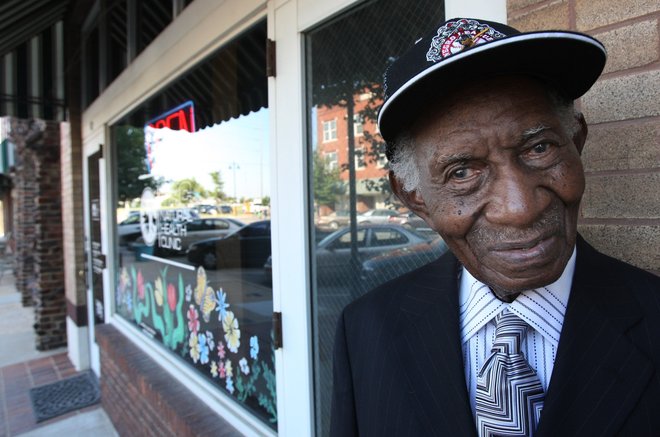For the past several years Georgia-native Roosevelt Jackson has been making appearances across the country at baseball parks and at public events commemorating Negro baseball. At these events, the now 95-year old African-American is usually hailed as the “oldest living former Negro Leagues player.”
Moreover, in 2010, the Georgia State Senate adopted a resolution praising Mr. Jackson for his contributions to baseball, to civil rights, and to African-American culture.
Though by all accounts, Jackson is a gracious, intelligent, and compassionate individual who devotes much of his public remarks to the accomplishments of Martin Luther King, Barrack Obama, and the Civil Rights Movement, a number of individuals knowledgeable about the history of the African-American baseball have pointed out that there is no record that Roosevelt Jackson ever played in the Negro Leagues.
Is there merit to such charges? Well, yes and no.
There is no doubt that Jackson (pictured below) played and managed in a number of black-only professional and semi-professional baseball leagues in the 1930’s and 1940’s. That much is uncontested.
What Jackson did not do was to play in any of the all-black leagues traditionally thought of as the Negro “Major” Leagues. So the “problem” of whether Roosevelt Jackson is a veteran of the Negro Leagues is really one of semantics.
(This terminology problem is not limited to the history of the Negro leagues. Even today, many baseball fans use the terms “professional” baseball” and “Major League” baseball interchangeably, although “professional” baseball is logically a much broader category that includes the Minor Leagues of Organized Baseball as well as independent professional leagues.)
The “Major Leagues” of black baseball are usually viewed as those leagues which contained teams drawn from a wide geographic area and which included most of the top African-American baseball players. The seven leagues widely viewed as “major leagues” are listed below:
- Negro National League I (1920-1931)
- Eastern Colored League (1923-1928)
- American Negro League (1929)
- East-West League (1932, folded mid-season)
- Negro Southern League (major league, 1932 only, otherwise a minor league)
- Negro National League II (1933-1948)
- Negro American League (1937-1960)
Most of the historical accounts of Negro League baseball focus upon the above leagues, hence, the frequent assumption that “Negro League” and “Negro Major League” are synonyms.
To his credit, Roosevelt Jackson has never claimed to have played in any of the above listed leagues. His career was spent almost entirely playing in all black minor or semi-pro leagues, most of which were located in southern Florida. The list of teams with which he played includes the largely forgotten Miami Globetrotters, Hollywood Redbirds, Miami Red Sox, Belle Glade Redwings, Florida Cuban Giants, the Lucky Stars, the Danny Dodgers; Ft. Lauderdale Braves, Pompano Beach Yankees, Ft. Lauderdale Lucky Stars, Ft. Lauderdale Gray Sox, and the Buffalo Red Sox (a travelling team that appears to have played many of its games in West Virginia and Pennsylvania).
Jackson is a survivor of an era in which even baseball was rigorously segregated, and even if he did “only” play in the Negro “minor leagues,” his accomplishments, memories, and character are clearly worthy of remembrance.
Milwaukeean Dennis Biddle has for many years claimed to have been one of the younger veterans of the Negro Leagues, and has even presented statistics he supposedly compiled as a pitcher for the Chicago American Giants in 1953 and 1954. He also has claimed to have been signed by the Chicago Cubs in 1955, only to suffer a career ending injury in spring training.
The problem with Biddle’s story is that the team he supposed play for, the Chicago American Giants of the Negro American League, went out of existence after the 1952 season, before the time that Biddle allegedly played for the team. The Chicago Defender, the Windy City’s leading African-American newspaper reported in the spring of 1953 that the American Giants might be revived for the second half of the 1953 season, but no revival was forthcoming.
It is possible that Biddle could have played for some semi-pro team in Chicago that took up the name Chicago American Giants in 1953, but Biddle’s version of his story clearly indicates that he played in the Negro Major Leagues. (There also appears to no independent evidence of his signing by the Cubs.)
Although a number of Milwaukeeans, ranging from Marty Greenberg to the Brewer upper management to Tom Barrett, have in the past uncritically accepted Biddle’s story, others in the baseball world have questioned its veracity, including the National Sports Law Institute, the Negro Leagues Baseball Museum in Kansas City, and the Black Athlete Sports Network.
Whatever the merits of Biddle’s claim, the existence of veterans of black baseball, whether they played at the major, minor, or semi-pro level, is an important reminder of an unpleasant aspect of our society’s past. It is profoundly sad that a country founded on the premise that “all men are created equal” could exhibit such a degree of racism in the sport that was for a long time the “National Pastime.” However, it is also a reminder of the true resilience of African-American culture in the age of Jim Crow, and the history of the Negro Leagues is clearly worth preserving.


The photograph at the end of the post is of Roosevelt Jackson, age 95.